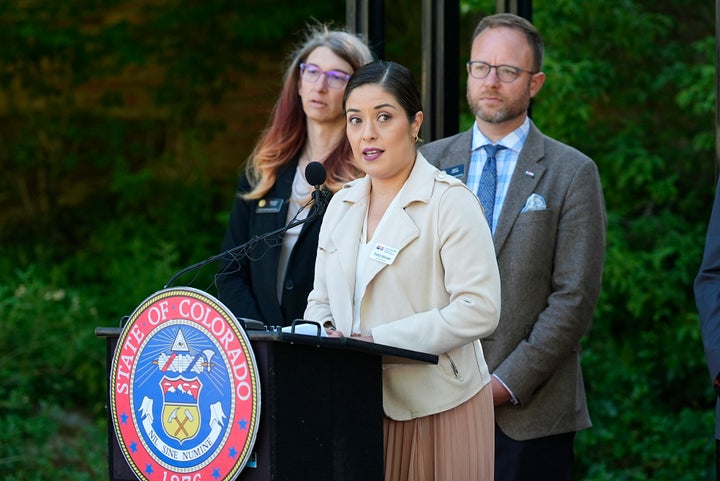🔴 Website 👉 https://u-s-news.com/
Telegram 👉 https://t.me/usnewscom_channel
Ryan Kendall remembers thumbing through the encyclopedia one day at lunch when he was 11 years old. When he landed on the word “homosexual,” he knew two things to be true: that it described himself, and that he had to keep it a secret.
It was 1994. Kendall was raised in a conservative evangelical community in Colorado Springs, Colorado. His classmates were the children of prominent religious leaders who lobbied for anti-gay policies.
At 13, Kendall’s dad found his journal, in which he’d acknowledged his sexual orientation. Kendall’s dad told him he was going to hell, and both parents sought the advice of Christian therapists to try to “make” their son straight.
Over the next year and a half, Kendall had weekly phone therapy with a psychologist who tried to parse out what had “caused” Kendall to be gay.
But Kendall had already accepted who he was and knew that nothing could change that.
“I just reached my breaking point,” Kendall, now 42 and a civil rights lawyer who advocates against so-called conversion therapy, told HuffPost.
At 16, he left home and revoked his parents’ custody. “You can only put a child through so much before something happens. I literally climbed out the window and ran away.”
“You can only put a child through so much before something happens.”
– Ryan Kendall, civil rights lawyer
The term “conversion therapy” is used to describe attempts to change a person’s sexual orientation or gender identity. In the 1970s, when homosexuality was still considered a mental illness, conversion therapy included techniques like electric shock therapy. Today, it mostly involves talk therapy, often with religious therapists.
Conversion therapy has been condemned by major medical and mental health organizations, which have found no evidence that these practices result in changes in sexual orientation or gender identity. In fact, LGBTQ+ adults and youth alike who underwent conversion therapy have higher rates of suicidality, depression and anxiety, and have higher levels of financial instability later in life, according to the American Psychological Association, the American Psychiatric Association and other mental health groups.
Today, 23 states (including Colorado) and Washington, D.C., have bans prohibiting licensed mental health practitioners from subjecting minors to conversion therapy practices. These bans have received support from Democratic leaders as well as some Republicans and faith leaders around the world.
But now, a case before the Supreme Court could threaten the future of such protections.
On Oct. 7, the court will hear arguments for Chiles v. Salazar, a case brought by Kaley Chiles, a Christian licensed counselor in Colorado Springs who claims that the state’s 2019 ban on conversion therapy infringes on her freedom of speech.
Hard-won queer rights are under attack. HuffPost remains committed to standing with the LGBTQ+ community. Support our work by joining our membership program today.
Colorado’s Minor Conversion Therapy Law prohibits licensed mental health providers from practicing psychiatry “that attempts or purports to change an individual’s sexual orientation or gender identity.” This law does not interfere with treatments that “provide acceptance, support, and understanding” for children as they explore their gender or sexual orientation, so long as providers ensure that children are not engaging in activities that are “unlawful” or “unsafe.” Unlicensed religious counselors are exempt from regulation.
Chiles claims the Colorado ban restricts her ability to properly counsel minors who want “to resist same-sex relationships or align the client’s sense of identity and biological sex,” because she fears being penalized or fined by the law. But Chiles has also explicitly denied any desire to offer such counseling, saying in her brief that she “does not seek to impose her values or beliefs on her clients.”
In 2022, Chiles filed a suit in a Colorado district court against 16 state officials to challenge the ban, arguing that the First Amendment protects her speech even in a professional context.
Countering her claims, the head of Colorado’s Department of Regulatory Agencies, Patty Salazar, argued that talk therapy is different from other forms of speech and that medical providers don’t have First Amendment rights to violate legally mandated standards of care.
Chiles lost her case but appealed to the 10th U.S. Circuit Court of Appeals, which found, once again, that she had failed to demonstrate how the Colorado ban had violated her fundamental rights. Chiles then appealed to the Supreme Court, which in March agreed to take the case.
AP Photo/David Zalubowski
If the Supreme Court sides with Chiles, Colorado and other states will no longer be able to enforce bans prohibiting conversion therapy, which would punctuate a yearslong effort by conservative religious groups to undermine mental health safeguards for LGBTQ+ youth.
Chiles is represented by the Alliance Defending Freedom, the conservative Christian legal group that overturned Roe v. Wade and has spent years chipping away at anti-discrimination protections in the name of religious freedom. Thus far, the Supreme Court has handed the group several victories, allowing Christian cake makers and wedding website designers to discriminate against LGBTQ+ patrons.
Chiles and the ADF also cite a 409-page report from the Department of Health and Human Services that was released earlier this year and rejects a robust body of scientific evidence on the efficacy of gender-affirming care for transgender youth. Health and Human Services Secretary Robert F. Kennedy has promoted psychotherapy and “exploratory therapy” as “noninvasive alternatives” to the health care best practices for trans youth upheld by major medical associations.
LGBTQ+ advocates say that “exploratory therapy” is just one of a handful of deceptive names used to obscure the true intentions of conversion therapy practices.
“Historically these practices have been known by a wide range of names. ‘Reparative therapy,’ ‘sexual attraction, fluidity, exploration therapy,’ and ‘gender exploratory therapy’ is a current and recent name that is getting thrown around,” said Casey Pick, the director of law and policy at The Trevor Project, a suicide prevention organization serving LGBTQ+ youth.
“All of [these names] are intended to sound legitimate, to lean on the trust and authority that is given to psychology, and to avoid the scrutiny that comes whenever people understand that this is all the same old snake oil in new packages.”
In reality, bans on conversion therapy are seldom enforced by state licensing boards, and the enforcement that does happen is difficult to track, Pick said, in part because the laws are so new and claims brought by clients are sealed from the public. Colorado hasn’t taken action against any providers since its law went into effect in 2019, according to Colorado Attorney General Phil Weiser.
But that doesn’t mean the laws are ineffective. “Having these bans in place has a deterrent effect that prevents the harm from ever happening and that informs the public of the reality that these practices are dangerous and not a legitimate use of government issued licenses that so many people trusted,” Pick said.
“This is all the same old snake oil in new packages.”
– Casey Pick, director of law and policy at The Trevor Project
The case comes on the heels of a difficult Supreme Court summer term for LGBTQ+ rights. In June, the court upheld Tennessee’s ban on gender-affirming care for minors in U.S. V. Skrmetti. Now, 26 states ban treatments like puberty blockers and hormone therapy for youth, as the high court sided with Tennessee, another client of the ADF, that it had the power to regulate and prohibit trans health care.
Now, the ADF is leaning hard on recent legal precedents to make the case that Colorado’s ban on conversion therapy is a question of free speech — a framing the conservative justices on the Supreme Court have often seemed open to — rather than of regulating licensing requirements. In a 2018 decision called National Institute of Family & Life Advocates v. Beccerra, SCOTUS found that a California law regulating “crisis pregnancy centers” violated the First Amendment by requiring such centers to disclose whether they were licensed medical providers and provide information about the state’s public programs for abortion and reproductive care.
In that ruling, Justice Clarence Thomas wrote that “speech is not unprotected merely because it is uttered by professionals” and that states don’t have “unfettered power to reduce a group’s First Amendment rights by simply imposing a licensing requirement.”
Similarly, in 303 Creative v. Elenis, the Court found that Colorado’s anti-discrimination law violated the First Amendment because it could require a Christian website designer to make a wedding website for a gay couple. In that 2023 ruling, Justice Neil Gorsuch wrote that the “First Amendment extends to all persons engaged in expressive conduct, including those who seek profit.”
Two years ago, the highest court turned down a similar case also filed by the ADF, representing a Washington state-based therapist and advocate of conversion therapy. At the time, Thomas wrote in a dissent that Washington state’s conversion therapy ban was “viewpoint-based and content-based discrimination in its purest form,” and that when the time comes, the court should reconsider arguments around the First Amendment.
Now the ADF has the opportunity to make that same argument before the Supreme Court’s conservative majority, which has thus far delivered favorable rulings to the Trump administration and the religious right.
The threat of conversion therapy, though broadly discredited over the last 50 years, still haunts LGBTQ+ people of all ages. In the U.S., nearly 700,000 LGBTQ+ adults have received conversion therapy during their lives, including 350,000 who received it as adolescents, according to an amicus brief from the Williams Institute, an LGBTQ+ law and policy think tank at the University of California, Los Angeles. One 2023 study from The Trevor Project found that roughly 1,400 young people were subjected to conversion therapy in that year alone.
As an adult, Kendall spent his 20s advocating for bans on conversion therapy. His testimony about his experiences helped bolster both a 2010 federal trial challenging California’s Prop 8 ban on same-sex marriage and the 2012 push for the first-in-the-nation ban on conversion therapy. The fight against conversion therapy has defined much of his life’s work.
Now, more than a decade later, Kendall is sharing his story again as part of an amicus brief with seven other survivors of conversion therapy to protect a law that he would have benefited from as a young person.
“I like to say that one of the greatest gifts I’ve given myself is a life beyond conversion therapy,” Kendall said. These days, his work revolves around fighting anti-LGBTQ+ book bans in Southern California on behalf of trans organizers.
“I want to tell [queer and trans kids] there’s nothing wrong with who they are, conversion therapy is a lie, and they deserve to live a life authentically. Your identity is beautiful, you’re a miracle, and don’t let conversion therapy take that away.”

